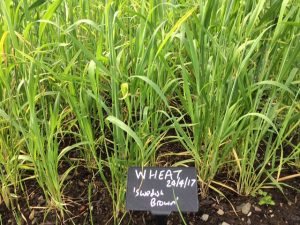Each year, for the past four years, leaders from industry, government, the third sector and research have gathered in Stockholm for the EAT Forum to look at global issues relating to food. This year there was a focus on achieving the Sustainable Development Goals (http://www.un.org/sustainabledevelopment/sustainable-development-goals/), food security and the importance of maintaining agricultural biodiversity to build the resilence our farming will need in the face of changing environments. An impressive list of international players was able to add fascinating insights and creative solutions to the challenge of feeding a growing population with healthy and nutritious food, in a warmer and increasingly unpredictable climate.
It felt a real privilege to be among so many experts whose focus was on sharing knowledge and collaborating across borders and disciplines to deal with a daunting but achievable task. Some of the facts that emerged were very disturbing. For example, more people suffer from obesity than malnutrition, food poverty exists even within the richest countries, the countries that will suffer the greatest impact of future climate change are also some of the poorest and the diversity of crop plants is declining fast.
The Crop Trust has been at the centre of galvanising support for a new campaign called Food Forever that will engage with people on the importance of conserving agrobiodiversity including traditional varieties of agricultural crops, the wild relatives of crop plants and under-exploited food plants, in order to provide the resource from which new food-crop varieties and farming systems can develop in future (https://www.croptrust.org/in-the-news/introducing-food-forever-initiative/https://www.croptrust.org/in-the-news/introducing-food-forever-initiative/). They want to reverse the current trend where the diversity of food plants is shrinking, by logging, banking and growing cultivars, land races and their wild relations that have potential, as yet unrealised, for becoming the crops of the future.
RBGE’s botanical explorations and research in to the plant resources of over 30 different countries across the world will be able to feed directly into this campaign and through our membership of Botanic Garden Conservation International, who are a Food Forever founding partner, we hope to be able to be able to support this initiative. It also aligns closely to another public engagement consortium in which we play an active part – the BigPicnic project which has been the subject of previous Botanics Stories (https://stories.rbge.org.uk/archives/author/mcoleman).
Botanics Stories
RBGE Personal & Project Stories

